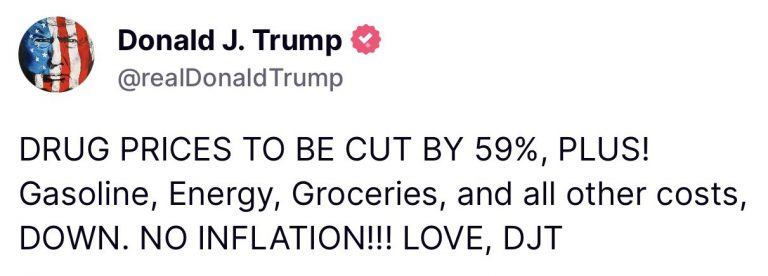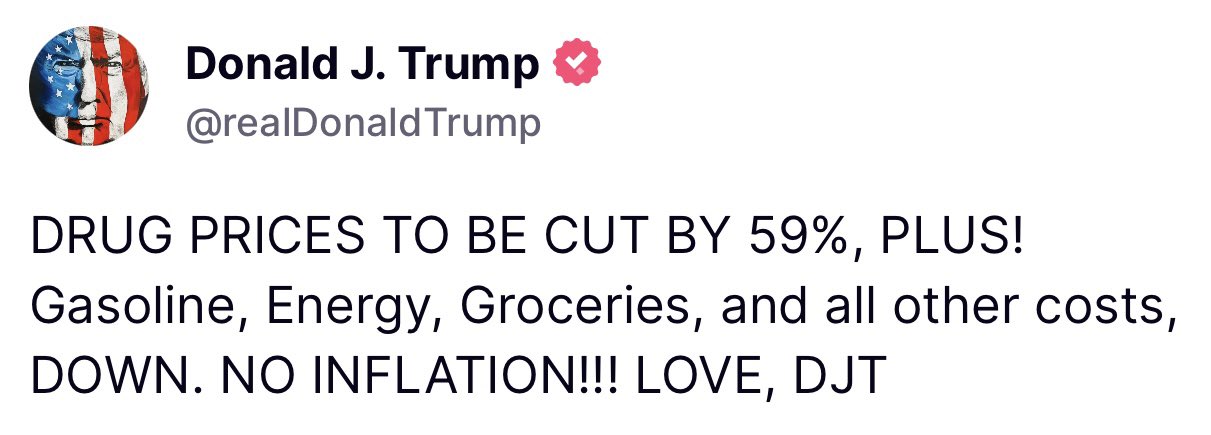
President Donald Trump on Monday signed a sweeping executive order that could shake the foundations of America’s pharmaceutical pricing model, setting a 30-day deadline for drugmakers to cut the cost of prescription drugs by 59% or face new pricing regulations tied to what foreign governments pay.
The move marks the administration’s most aggressive push yet to tackle what Trump calls “a rigged system” that has forced Americans to pay more than any other country for the same medicines.
At the White House press briefing, Trump said the U.S. will no longer be the pharmaceutical industry’s “piggy bank,” describing the order as a major correction that would “equalize” drug pricing globally.
Register for Tekedia Mini-MBA edition 19 (Feb 9 – May 2, 2026).
Register for Tekedia AI in Business Masterclass.
Join Tekedia Capital Syndicate and co-invest in great global startups.
Register for Tekedia AI Lab.
“We’re all going to pay the same. We’re going to pay what Europe pays,” Trump said, flanked by Health Secretary Robert F. Kennedy Jr., CMS administrator Dr. Mehmet Oz, FDA commissioner Dr. Marty Makary, and NIH director Jay Bhattacharya.
The executive order mandates the Department of Health and Human Services (HHS) to broker new prices for medications. If negotiations with drugmakers fail within 30 days, the administration will implement a new regulation that ties U.S. drug prices to the much lower prices paid by countries in Europe and elsewhere — a controversial model dubbed the “most favored nation” rule.
While the potential savings for Medicare and Medicaid could be substantial, it remains unclear how much of that relief will trickle down to the millions of Americans covered by private insurance, where government leverage over pricing is limited. However, Trump claimed the order would “save taxpayers trillions of dollars” and “reduce healthcare costs by numbers never even thought of before.”

No official analysis was released by the White House on how much the order would save or which drugs would be impacted, though Trump and his advisers suggested the measure could cover high-cost injectables, cancer treatments, and other expensive medications administered under Medicare.
Industry Pushback and Unanswered Questions
The pharmaceutical industry, a powerful lobbying force in Washington, has already begun pushing back. In a statement released on Sunday, Stephen J. Ubl, president and CEO of the Pharmaceutical Research and Manufacturers of America (PhRMA), slammed the plan as a “bad deal” that could harm patients and stifle innovation.
“Importing foreign prices will cut billions of dollars from Medicare with no guarantee that it helps patients or improves their access to medicines,” Ubl said. “It jeopardizes the hundreds of billions our member companies are planning to invest in America, making us more reliant on China for innovative medicines.”
Ubl’s warning echoes the long-standing argument by drugmakers that high U.S. prices are essential to fund the research and development of new drugs — a claim Trump dismissed as hollow.
“Pharmaceutical companies make most of their profits from America,” Trump said on Monday. “That’s not a good thing.”
What remains uncertain is the extent to which the president’s order, if implemented, will hurt the industry’s bottom line. Analysts say that tying drug prices to international benchmarks could deal a serious blow to pharmaceutical firms’ revenue growth, especially since many rely heavily on high-margin sales in the United States to offset lower returns abroad.
The pharmaceutical industry globally is valued at around $1.5 trillion, with U.S.-based companies representing a significant portion of that total. Giants like Pfizer, Merck, Johnson & Johnson, AbbVie, and Eli Lilly have seen massive market capitalizations, with the top five U.S. pharma firms alone collectively worth over $1 trillion as of early 2025. Any disruption to their U.S. pricing model would likely send ripple effects across global financial markets.
Trump’s critics note that the announcement, like many of his previous attempts to take on Big Pharma, may face serious legal and logistical hurdles.
Legal Clouds Above the Executive Orders
Trump’s earlier attempt to implement a “most favored nation” pricing policy during the final stretch of his first term in 2020 was blocked in federal court. At the time, the industry successfully argued that the rule would give foreign governments undue influence over how drugs are priced in the U.S., and a judge halted the plan on procedural grounds. President Joe Biden’s administration later abandoned it.
This time, Trump appears more determined to see it through. He’s also backed by a restructured health leadership team that includes Kennedy, Oz, and Makary — all outspoken about healthcare costs and transparency.
Speaking on Monday, Oz said the HHS will engage directly with pharmaceutical executives over the next 30 days to demand revised pricing based on international benchmarks. If talks break down, the administration will proceed with regulatory changes, bypassing Congress, where multiple bipartisan efforts to lower drug costs have failed.
The legal gray area around whether an executive order can force such sweeping pricing changes, particularly outside of Medicare and Medicaid, remains unresolved. But Trump, banking on public frustration over drug costs, appears willing to test the limits.
Political Capital vs. Corporate Lobbying
Trump’s message was that the U.S. has for too long subsidized cheaper drugs for the rest of the world. He accused pharmaceutical companies of deceptive messaging about R&D costs and vowed not to be swayed by the industry’s campaign contributions.
“For years, they said it was Research and Development Costs,” he wrote Sunday on Truth Social. “And that all of these costs were, and would be, for no reason whatsoever, borne by the ‘suckers’ of America, ALONE.”
“Campaign contributions can do wonders, but not with me, and not with the Republican Party,” Trump added. “We are going to do the right thing.”
The pharmaceutical lobby is one of the most powerful in Washington. According to OpenSecrets, the industry spent over $375 million on lobbying in 2023 alone, more than any other sector, and has consistently ranked among the top donors to both parties.
The potential impact on global drug pricing strategies and U.S. healthcare costs is hard to predict. While Americans pay more for drugs, the savings often go toward innovation that benefits global populations. Many believe that weakening the financial base could slow the pipeline for new treatments.
But Trump’s supporters say the current system is untenable.



